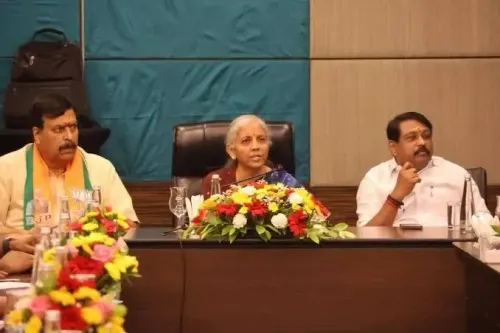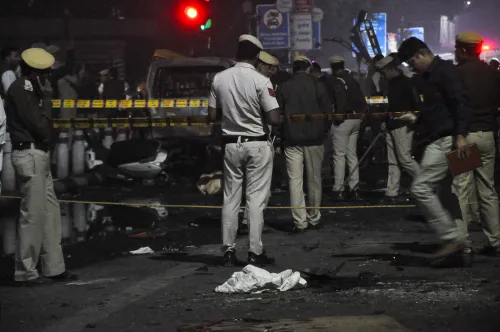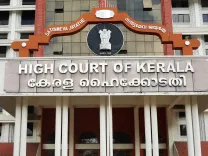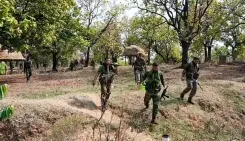Israel's Delegation Heads to Doha on March 10 to Propel Gaza Ceasefire Discussions
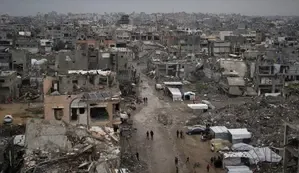
Synopsis
Key Takeaways
- Israel is sending a delegation to Doha for ceasefire talks.
- Negotiations aim to secure the release of Israeli hostages held by Hamas.
- Hamas indicates positive signs for the next phase of the ceasefire agreement.
- Foreign Ministers from Muslim nations support a reconstruction plan for Gaza.
- Israeli military actions have resulted in significant casualties in Gaza.
Jerusalem, March 9 (NationPress) - Israel is dispatching a delegation to Qatar's capital Doha on Monday to facilitate talks aimed at renewing the ceasefire in Gaza and securing the release of Israeli hostages held by Hamas, as stated by the Israeli Prime Minister's Office.
The announcement made on Saturday revealed that Israel accepted the invitation from the mediating countries, with support from the US, according to the Xinhua news agency.
Earlier that day, Hamas indicated there were promising developments regarding negotiations for the next phase of the ceasefire agreement in Gaza.
Hamas spokesman Abdul Latif Al-Qanou stated in a press release, "Ongoing efforts by Egyptian and Qatari mediators aim to finalize the ceasefire agreement's implementation and initiate discussions for its subsequent phase, with encouraging signs in that regard."
He emphasized Hamas's willingness to participate in these negotiations in a manner that aligns with the aspirations of the Palestinian populace.
No immediate response has been issued from the White House, which confirmed on Wednesday that direct US discussions with Hamas were taking place.
Throughout the past week, Israel has urged Hamas to release half of the remaining hostages in exchange for extending the initial phase, which concluded last weekend, and a commitment to negotiate a sustainable truce. It is believed that Hamas is holding 24 living hostages along with the remains of 34 others.
Israel halted all supplies to Gaza and its more than two million residents as it pressed Hamas for compliance. Hamas has warned that this action would have repercussions for the remaining hostages.
The ceasefire has momentarily halted the most brutal and destructive conflict ever witnessed between Israel and Hamas, ignited by the terrorist attack led by Hamas on southern Israel on October 7, 2023. The first phase of the ceasefire facilitated the return of 25 living hostages and the remains of eight others in exchange for nearly 2,000 Palestinian prisoners.
Israeli forces have retreated to buffer zones within Gaza, allowing hundreds of thousands of displaced Palestinians to return to northern Gaza for the first time since the war began, while hundreds of aid trucks entered daily until Israel suspended supplies.
Before their weekly demonstration in Tel Aviv, relatives of hostages appealed to US President Donald Trump, who met with eight former hostages on Wednesday.
"Mr. President, a return to war signifies a death sentence for the living hostages left behind. Please, do not permit Netanyahu to sacrifice them."
Foreign Ministers from various Muslim nations dismissed Trump's calls to evacuate the Gaza Strip of its Palestinian population on Saturday, endorsing a plan for an administrative committee to govern the region and facilitate reconstruction.
The Foreign Ministers convened in Saudi Arabia for a special session of the Organisation of Islamic Cooperation to discuss the Gaza situation. The OIC comprises 57 countries with predominantly Muslim populations.
They expressed support for a reconstruction plan for Gaza proposed by Egypt and endorsed by Arab states, including Saudi Arabia and Jordan.
While refraining from naming Trump, the Ministers' statement asserted their rejection of "plans aimed at displacing the Palestinian people individually or collectively … as ethnic cleansing, a serious violation of international law and a crime against humanity."
They condemned actions that lead to "starvation policies," which they claim are designed to coerce Palestinians into leaving, referencing Israel's suspension of all supplies to Gaza.
Trump has suggested that Gaza's population should be permanently resettled elsewhere so that the United States can take control over the territory and develop it for others. Palestinians have consistently rebuffed calls to leave.
The Ministers at the OIC meeting advocated for a proposal that an administrative committee should replace Hamas in governing Gaza. This committee would operate "under the umbrella" of the Palestinian Authority (PA), which is situated in the occupied West Bank. Israel has opposed any role for the PA in Gaza but has not offered an alternative governance model post-conflict.
The Foreign Ministers of France, Germany, Italy, and the United Kingdom released a joint statement welcoming the Arab initiative for a Gaza reconstruction strategy, labeling it "a realistic path." They stated that "Hamas must no longer govern Gaza nor pose a threat to Israel," expressing support for a significant role for the PA.
Early Saturday morning, an Israeli airstrike resulted in the deaths of two Palestinians in the southernmost city of Rafah, as reported by the Health Ministry. The Israeli military claimed that it targeted several individuals who appeared to be operating a drone that had crossed into Israel.
According to Gaza's Health Ministry, Israel's military campaign has claimed the lives of over 48,000 Palestinians in Gaza, predominantly women and children, although the Ministry does not specify how many of the deceased were combatants. Israel asserts that around 18,000 of the fatalities were Hamas operatives.
Hamas' assault in October 2023 resulted in approximately 1,200 deaths, mostly civilians, in Israel and took 251 individuals hostage. Most hostages have been released through ceasefire agreements or other negotiations.


